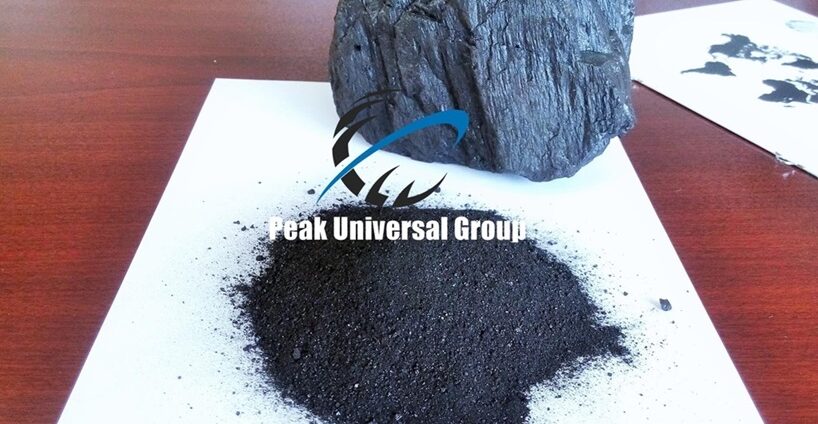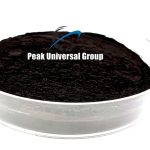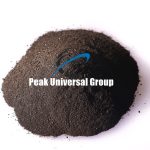
Gilsonite Details, Features & Industrial Benefits
Gilsonite details and features – Gilsonite, also known as Natural Asphalt, Mineral Bitumen, or Asphaltite, is a naturally occurring solid hydrocarbon. It is renowned for its unique physical and chemical properties, making it a versatile material with a wide range of industrial applications. This blog delves into the detailed aspects of Gilsonite, its uses, applications, advantages, disadvantages, features, and price factors, with a focus on Peak Universal Business as a leading supplier.
What is Gilsonite?
Gilsonite details and features – Gilsonite is a naturally occurring form of asphalt found primarily in the Uintah Basin in northeastern Utah, USA. It appears as a shiny, black, brittle substance with a high carbon content. Gilsonite is often referred to by various names, including Natural Asphalt, Mineral Bitumen, and Asphaltite, highlighting its resemblance to traditional petroleum-based asphalt.
Key Features of Gilsonite
- Appearance: Black and shiny, brittle in nature.
- Composition: High carbon content with hydrogen, nitrogen, sulfur, and oxygen.
- Solubility: Soluble in aromatic and aliphatic solvents, but insoluble in water.
- Thermal Stability: High melting point, making it stable under high temperatures.
Types of Gilsonite
Gilsonite is available in various forms, including lump, powder, and granulated. The choice of form depends on the intended application.
- Lump Gilsonite: Used in applications where large chunks are required for processing.
- Powder Gilsonite: Finely ground Gilsonite, ideal for use in paints, inks, and as an additive in drilling fluids.
- Granulated Gilsonite: Intermediate form between lump and powder, used in specific industrial applications.
Chemical & Physical Properties
| Property | Typical Value |
|---|---|
| Appearance | Black, brittle solid |
| Softening Point | 140–220 °C |
| Ash Content | < 5% to > 15% |
| Solubility in Toluene | > 85% (high-purity) |
| Moisture Content | < 1% |
| Specific Gravity | ~1.05 |
Uses and Applications of Gilsonite
Gilsonite Uses, details and features – Gilsonite’s unique properties make it suitable for a wide range of industrial applications. Here are some of its primary uses:
- Oil and Gas Industry:
- Drilling Fluids: Gilsonite is used as a drilling mud additive to control fluid loss and improve the stability of the wellbore.
- Cementing: Enhances the properties of cementing formulations, providing better zonal isolation and strength.
- Asphalt and Road Construction:
- Pavement Modifier: Gilsonite improves the performance of asphalt pavements by increasing resistance to deformation and fatigue.
- Sealing: Used in crack sealants and seal coating applications to enhance durability and flexibility.
- Paints and Coatings:
- Ink Industry: Provides gloss, hardness, and water resistance in printing inks.
- Paints: Enhances the durability, adhesion, and resistance to weathering in industrial paints.
- Foundry Industry:
- Foundry Sands: Used as a carbon additive in foundry sands to improve the quality of castings and reduce defects.
- Chemical Industry:
- Adhesives and Sealants: Acts as a binder and filler, improving the performance of adhesives and sealants.
- Other Applications:
- Waterproofing: Used in waterproofing products to provide long-lasting protection against water ingress.
- Rubber Industry: Acts as a reinforcing agent in rubber compounds, improving strength and durability.
Advanced Industrial Applications
Gilsonite Advanced Industrial Applications, details and features – Gilsonite is finding increasing use in advanced industrial applications due to its unique properties.
- Nanotechnology: Research is exploring the use of Gilsonite in nanotechnology, where its carbon-rich composition can be utilized in developing new materials with enhanced properties.
- High-Performance Composites: Gilsonite’s ability to improve thermal stability and mechanical strength makes it an attractive additive for high-performance composite materials used in aerospace and automotive industries.
- Battery Technology: Emerging research is investigating the potential of Gilsonite in improving the performance and longevity of batteries, particularly in enhancing the anode materials of lithium-ion batteries.
Environmental Impacts
Gilsonite Environmental Impacts, details and features – While Gilsonite offers numerous industrial benefits, it is essential to consider its environmental impacts.
- Extraction Process: Gilsonite mining can lead to habitat disruption and soil erosion. Responsible mining practices and rehabilitation of mining sites are crucial to minimize these impacts.
- Emissions: The processing of Gilsonite can release volatile organic compounds (VOCs) and other pollutants. Implementing emission control technologies can help mitigate these environmental concerns.
- Recyclability: Gilsonite-enhanced materials, such as asphalt, can be recycled, reducing the need for new raw materials and minimizing waste.
Future Prospects of Gilsonite
The future of Gilsonite looks promising, with ongoing research and development opening new avenues for its application.
- Sustainable Alternatives: With increasing focus on sustainability, Gilsonite’s role as a natural alternative to synthetic additives will likely expand.
- Innovation in Applications: Continued innovation in applications, such as advanced composites and energy storage, will drive demand for Gilsonite.
- Global Market Growth: As industries worldwide recognize the benefits of Gilsonite, its global market is expected to grow, with significant opportunities in emerging economies.
Advantages of Gilsonite
Gilsonite offers several advantages that make it a preferred choice in various industries:
- Versatility: Suitable for a wide range of applications due to its unique chemical and physical properties.
- Cost-Effective: Provides performance benefits at a lower cost compared to synthetic alternatives.
- Environmentally Friendly: Being a natural product, Gilsonite has a lower environmental impact compared to synthetic materials.
- Improved Performance: Enhances the properties of products, such as increased durability, adhesion, and thermal stability.
- Ease of Use: Available in various forms, making it easy to incorporate into different industrial processes.
Disadvantages of Gilsonite
Despite its numerous advantages, Gilsonite also has some limitations:
- Availability: Natural deposits are limited, and extraction is geographically restricted, primarily to the Uintah Basin.
- Consistency: Natural variations in composition can lead to inconsistencies in performance.
- Processing Challenges: Requires specialized equipment and processes for extraction and refinement.
- Solubility Issues: Insoluble in water, which limits its use in water-based applications.
Features of Gilsonite
Gilsonite’s features are a result of its unique composition and properties:
- High Carbon Content: Provides excellent thermal stability and strength.
- Brittle Nature: Allows it to be easily ground into powder form.
- Hydrophobic: Repels water, making it ideal for waterproofing applications.
- Adhesive Properties: Acts as a natural binder in various formulations.
- Chemical Resistance: Resistant to acids, alkalis, and salts, enhancing its durability in harsh environments.
Price Factors
The price of Gilsonite can vary based on several factors:
- Purity and Quality: Higher purity Gilsonite commands a premium price due to its superior performance characteristics.
- Form: Powdered and granulated forms may be more expensive due to the additional processing required.
- Supply and Demand: Limited geographic availability and high demand can drive up prices.
- Market Conditions: Fluctuations in the global oil and gas market can impact the price of Gilsonite.
- Transportation Costs: The cost of shipping and logistics, especially for international deliveries, can influence the final price.
Peak Universal Business: Your Trusted Supplier of Gilsonite (Powder Gilsonite)
Peak Universal Business is a leading supplier of high-quality Gilsonite. Here’s why you should choose us:
- Quality Assurance: We adhere to strict quality control standards to ensure that our Gilsonite meets the highest industry standards.
- Wide Range: We offer Gilsonite in various forms, including lump, powder, and granulated, to meet diverse industrial needs.
- Expertise: With extensive experience in the industry, we provide expert advice and support to help you select the right product for your application.
- Competitive Pricing: We offer competitive prices without compromising on quality, ensuring you get the best value for your investment.
- Customer Support: Our dedicated customer support team is always ready to assist with any queries or special requirements.
Frequently Asked Questions (FAQ)
🔹 What makes Gilsonite different from petroleum asphalt?
Answer: Gilsonite is a naturally solid mineral with better solubility, binding strength, and thermal stability compared to liquid petroleum asphalt.
🔹 Is Gilsonite compatible with polymers and resins?
Answer: Yes. It blends well with SBS, APP, EVA, and other resins used in waterproofing, roofing, and modified asphalt products.
🔹 What mesh sizes is Gilsonite available in?
Answer: Gilsonite is available in powder (200 mesh), granular, and lump forms, depending on application requirements.
🔹 Is Gilsonite safe to handle?
Answer: Yes, Gilsonite is non-toxic and non-carcinogenic, but standard dust-handling precautions are advised when working with powdered forms.
Conclusion
Gilsonite details and features – Gilsonite, also known as Natural Asphalt, Mineral Bitumen, or Asphaltite, is a versatile and valuable material with a wide range of industrial applications. Its unique properties make it an ideal choice for the oil and gas industry, road construction, paints and coatings, and many other sectors. Despite its limitations, the advantages of Gilsonite far outweigh the drawbacks, making it a cost-effective and environmentally friendly option.
With Peak Universal Business as your trusted supplier, you can be assured of high-quality Gilsonite that meets your specific needs. Whether you require Gilsonite in lump, powder, or granulated form, we have the expertise and resources to deliver exceptional products and services.
You can Read More about Natural Asphalt and Powder Gilsonite and Mineral Bitumen Here:
Explore the key features, composition, and industrial benefits of Gilsonite — a high-performance natural asphalt used in drilling, asphalt, coatings, and more.
-
Natural asphalt features and benefits
-
Gilsonite technical details
-
Bituminous resin properties
-
Uintaite characteristics
-
Difference between Bitumen and Gilsonite
-
Powder Gilsonite as drilling fluid additive
Looking to Source High-Quality Gilsonite?
We supply Low Ash, Medium Ash, and Custom Mesh Sizes for all industries. Contact us for TDS, MSDS, pricing, and global shipping.
If You have any other Query or Question you want to ask, Please don’t hesitate to Contact Us
- 0 comment





Leave a Reply